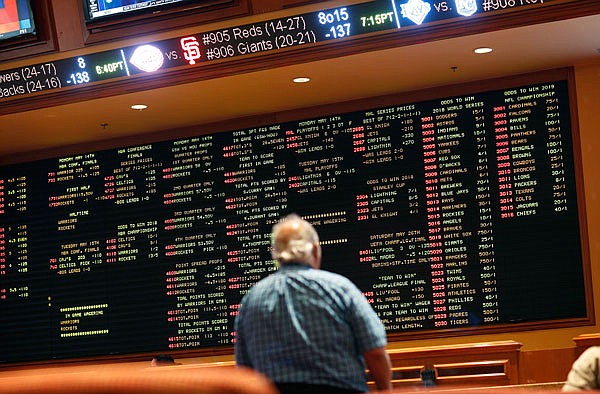Last Monday's decision by the Supreme Court overturned the Professional and Amateur Sports Protection Act, a 1992 law that effectively banned sports betting in all states except Nevada.
A handful of states - led by New Jersey, who took the case to the Supreme Court - should be accepting sports bets as soon as the next few weeks.
What about Missouri? Does the state really want to add sports betting to its existing riverboat casinos and lottery?
Here's a brief explanation about sports wagers. I won't dive too deep into the details, but here's an example for an NFL game using the betting line.
You see the Chiefs are a three-point favorite at home against the Raiders and you want to bet on Kansas City. For the purpose of this example, you want to win $100 with this bet. You would hand over $110, $100 for the bet and $10 for what is known as the "vigorish," essentially a 10 percent handling fee each sports book charges to take the bet.
In a perfect world for the sports book, 50 percent of the bettors would take the Chiefs and 50 percent would take the Raiders. Why? When that happens, and it very rarely does, that's a guaranteed profit because of the handling fee.
Sports books in Nevada don't have a 10 percent profit margin, it's closer to 5 percent. But that's enough to make it enticing for someone to open a sports book if a state like Missouri legalizes it.
But I believe there are a few hard rules that need to be in place if Missouri was to pass legislation to allow sports wagering.
The sports books would be required to have a physical presence in Missouri. That means establishing a place to physically make a bet on a riverboat casino, most of which are already owned by corporations that have sports books in Las Vegas and are familiar with the process. It would have to be more than a kiosk, the sports book would be required to be staffed. That means jobs.
Missouri residents would have the option of betting online, through an app on their phone or computer. After registering an account with a valid state-issued license, a bettor would fund it electronically and use it to make wagers and/or withdraw potential winnings.
The current tax rate for sportsbooks in Nevada is 6.75 percent. That's a good place for a state to start, although I'm going to guess it will be a little low if sports wagering is allowed in the state. Pennsylvania is proposing a 34 percent tax rate and casinos are balking about adding sports wagering.
Professional sports leagues have called for an "integrity" fee, to the tune of one percent of the total amount bet in a state. They say the fee would be used to put safeguards in place so gambling doesn't interfere with the integrity of the games in their leagues.
That should be a non-starter for any state to accept. The sportsbooks in Las Vegas are the first line of defense when it comes to making sure games are not fixed and pay no such fee to the leagues. If somebody has an inclination to fix a game, they'd do it whether the bet they were making was legal or not.
And if the leagues say the fee is needed to monitor in-game wagering? That's where a bet could be made on something as simple as will be the first pass of the game be incomplete. You set a cap on those bets so low the idea of a quarterback, who has a multi-million dollar contract hanging in the balance, would do that would be laughable.
Professional sports teams are already profiting from gambling in Missouri. You can purchase team-themed scratchers tickets, you can watch your Keno numbers on a stadium-themed results board. That's not happening without some sort of payment.
The Missouri legislature had a handful of bills dealing with sports wager proposed in the recently completed session, so the idea of making it legal figures to be on the table again in the future.
Profits would come with volume betting and reasonable tax rates and any proposed law should keep that in mind. It cannot be made so cost prohibitive casinos and betters can't see a way to make a profit because of high taxes.
There's money to be made by Missouri if sports wagering is made legal. It just can't afford to get too greedy.


